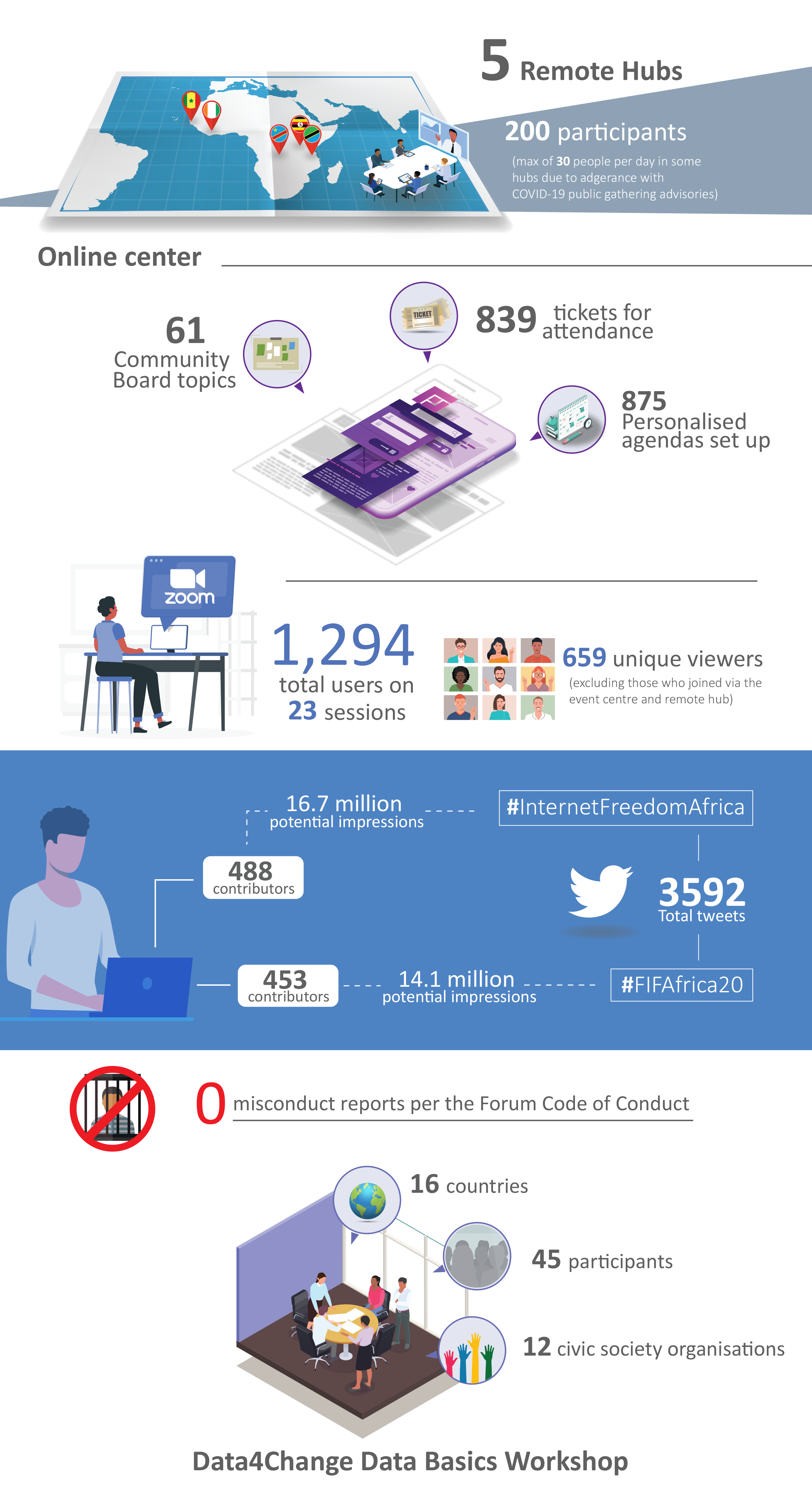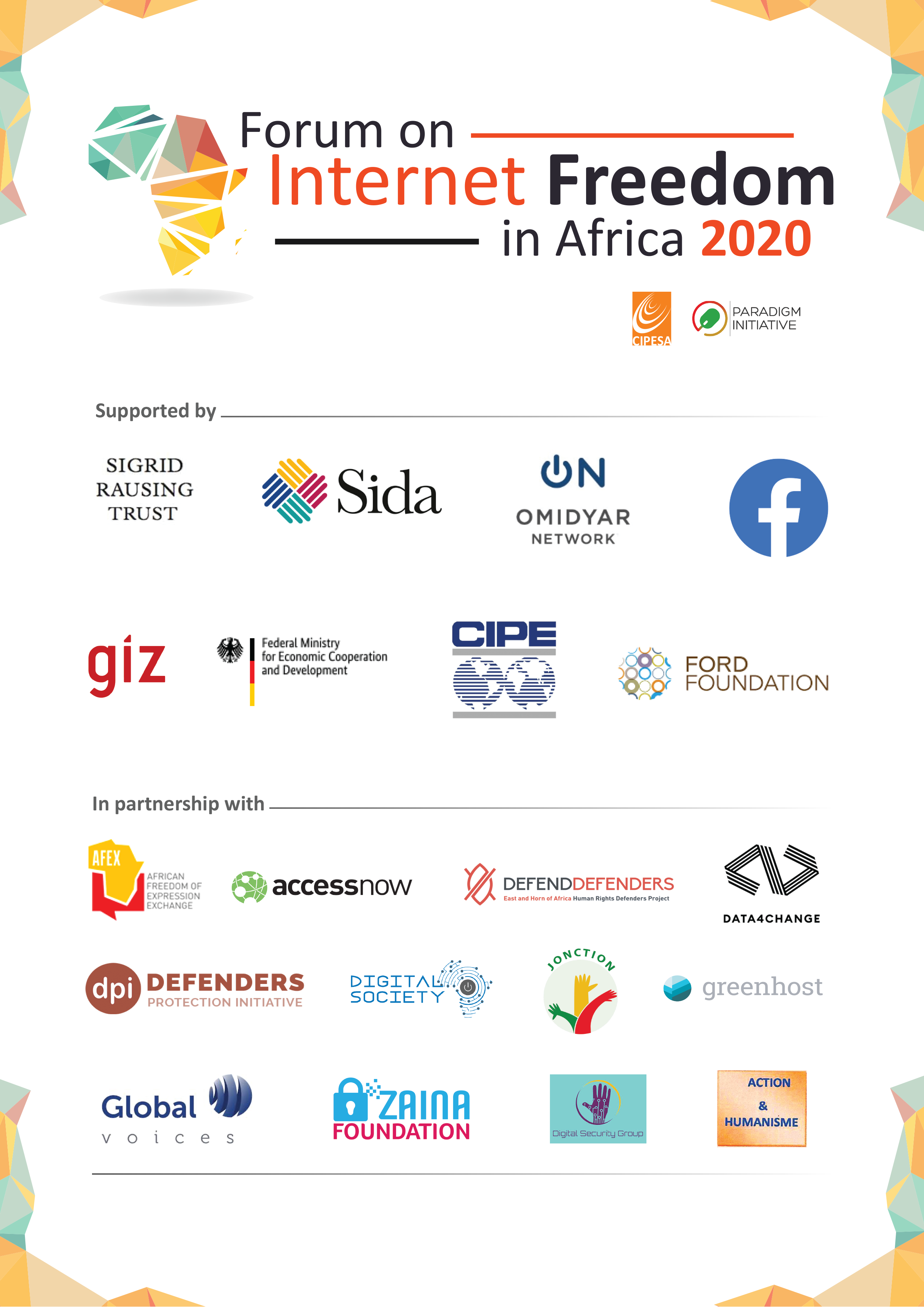- Overview
- FIFAfrica20 Statistics
- Remote Hubs
- Launches
- Online Skills Hub
- Media
- Supporters
CIPESA in partnership with Paradigm Initiative hosted the 2020 edition of the Forum on Internet Freedom in Africa (FIFAfrica20) on September 28-30, 2020. In light of Covid-19, FIFAfrica20 adopted a hybrid approach - blending online and physical interactions. Over the course of three days, the FIFAfrica20 agenda featured physical and virtual engagements, including satellite events in select countries, virtual sessions, and pre-recorded content.
The keynote panel of FIFAfrica20 set the tone of the event with a discussion of digital rights opportunities amidst the pandemic. Subsequent session themes included on civic space, politics and democracy in Africa; meaningful connectivity in Africa, including as a means for realisation of the right to education in South Africa; consumer protection and inclusive digital economies; and resetting digital rights amidst the Covid-19 fall out.
Misinformation online was also a key topic, with a remote workshop in Dakar, Senegal engaging stakeholders on misinformation and its impact on freedom of expression online during the ongoing Covid-19 pandemic. Virtually, Waterbear, a suite of tools for crowdsourcing and understanding misinformation, was presented alongside dialogue on misinformation harms and government responses to misinformation in Africa.
Sessions on strategic litigation for digital rights featured the launch of the revamped and multi-language Catalysts for Collaboration website and showcased learning in collaborative strategic litigation including in hostile political environments.
On safety and security online, a digital security and risk assessments workshop was held for investigative journalists and human rights activists in Kinshasa, Democratic Republic of Congo. In addition, a multilingual (English, French and Arabic) digital security hub provided virtual digital security support through a chat widget, email or messaging during the three days of FIFAfrica.
Meanwhile, sessions on data protection and privacy explored some of the rushed Covid-19 related laws and their implications on digital rights. There was also a session on guiding principles for data use during Covid-19 and the right to privacy within the revised Declaration of Principles on Freedom of Expression and Access to Information in Africa.
On inclusion of persons with disability in the digital society, a remote hub workshop in Abidjan, Cote d’Ivoire explored internet accessibility for persons with disability during Covid-19. A GSMA led talk on assistive technologies was also held, and CIPESA launched a report on how the telecommunications sector has largely excluded persons with disabilities from their service offerings in many African states.
Further on non-discrimination online, a collaborative session with the Africa Digital Rights Network (ADRN) explored the representation of African women on the internet, the implications of Covid-19 on online African feminist movement building and feminist research.
Other themes included Elections during Covid-19; trends in online content regulation; internet shutdowns; Encryption; Artificial Intelligence in Africa; transnational collaboration, partnerships and coalition-building to protect and expand digital rights across Africa; and best practices on how organisations can re-establish norms and relationships with funders and donors in the age of Covid-19.
The keynote panel of FIFAfrica20 set the tone of the event with a discussion of digital rights opportunities amidst the pandemic. Subsequent session themes included on civic space, politics and democracy in Africa; meaningful connectivity in Africa, including as a means for realisation of the right to education in South Africa; consumer protection and inclusive digital economies; and resetting digital rights amidst the Covid-19 fall out.
Misinformation online was also a key topic, with a remote workshop in Dakar, Senegal engaging stakeholders on misinformation and its impact on freedom of expression online during the ongoing Covid-19 pandemic. Virtually, Waterbear, a suite of tools for crowdsourcing and understanding misinformation, was presented alongside dialogue on misinformation harms and government responses to misinformation in Africa.
Sessions on strategic litigation for digital rights featured the launch of the revamped and multi-language Catalysts for Collaboration website and showcased learning in collaborative strategic litigation including in hostile political environments.
On safety and security online, a digital security and risk assessments workshop was held for investigative journalists and human rights activists in Kinshasa, Democratic Republic of Congo. In addition, a multilingual (English, French and Arabic) digital security hub provided virtual digital security support through a chat widget, email or messaging during the three days of FIFAfrica.
Meanwhile, sessions on data protection and privacy explored some of the rushed Covid-19 related laws and their implications on digital rights. There was also a session on guiding principles for data use during Covid-19 and the right to privacy within the revised Declaration of Principles on Freedom of Expression and Access to Information in Africa.
On inclusion of persons with disability in the digital society, a remote hub workshop in Abidjan, Cote d’Ivoire explored internet accessibility for persons with disability during Covid-19. A GSMA led talk on assistive technologies was also held, and CIPESA launched a report on how the telecommunications sector has largely excluded persons with disabilities from their service offerings in many African states.
Further on non-discrimination online, a collaborative session with the Africa Digital Rights Network (ADRN) explored the representation of African women on the internet, the implications of Covid-19 on online African feminist movement building and feminist research.
Other themes included Elections during Covid-19; trends in online content regulation; internet shutdowns; Encryption; Artificial Intelligence in Africa; transnational collaboration, partnerships and coalition-building to protect and expand digital rights across Africa; and best practices on how organisations can re-establish norms and relationships with funders and donors in the age of Covid-19.
 The Forum was as much online as it was offline. As part of the event, there were five remote locations each with an assortment of activities taking place. In Abidjan, Côte d'Ivoire, Action et Humanisme hosted 25 participants to engage on the barriers faced by persons with disabilities, especially during the pandemic. They reviewed the obligations of the government and developed recommendations. In the Democratic Republic of Congo, Kinsasha served as the location for a digital security training for 25 people. Similarly, in Dar es Salaam, Tanzania, the Zaina Foundation hosted 30 participants, a partly practical engagement which fell within their theme of promoting digital rights in a challenging environment. A timely discussion as the country heads to the polls on October 28, 2020. In Dakar, Senegal, Jonction hosted 25 people to compliment online discussion on Covid-19 and fake news. They focussed on the various obstacles to online freedom of expression in times of health crisis. Finally, Uganda served as a viewing hub for the various online sessions in addition to hosting the launch of a report on disability, the launch of the 2020 edition of the State of Internet Freedom in Africa, and a session that featured Africa Digital Rights Network (ADRN) member and author Nanjala Nyabola and Ugandan activist, Dr. Stella Nyanzi. Each of the three days had at least 30 members of the public present per the national Standard Operating Procedures (SOPs) at the time. Uganda also served as a physical location for the digital security Hub.
The Forum was as much online as it was offline. As part of the event, there were five remote locations each with an assortment of activities taking place. In Abidjan, Côte d'Ivoire, Action et Humanisme hosted 25 participants to engage on the barriers faced by persons with disabilities, especially during the pandemic. They reviewed the obligations of the government and developed recommendations. In the Democratic Republic of Congo, Kinsasha served as the location for a digital security training for 25 people. Similarly, in Dar es Salaam, Tanzania, the Zaina Foundation hosted 30 participants, a partly practical engagement which fell within their theme of promoting digital rights in a challenging environment. A timely discussion as the country heads to the polls on October 28, 2020. In Dakar, Senegal, Jonction hosted 25 people to compliment online discussion on Covid-19 and fake news. They focussed on the various obstacles to online freedom of expression in times of health crisis. Finally, Uganda served as a viewing hub for the various online sessions in addition to hosting the launch of a report on disability, the launch of the 2020 edition of the State of Internet Freedom in Africa, and a session that featured Africa Digital Rights Network (ADRN) member and author Nanjala Nyabola and Ugandan activist, Dr. Stella Nyanzi. Each of the three days had at least 30 members of the public present per the national Standard Operating Procedures (SOPs) at the time. Uganda also served as a physical location for the digital security Hub. The creation of useful resources, networks, and content that contribute to the advancement of digital rights is among the highlights of the Forum. Here are some of the reports and resources that were launched and re-launched during the Forum.
State of Internet Freedom in Africa 2020
How Telecoms are failing Persons With Disabilities
Weeklong Data Skills Workshop: As part of the Forum, Data4Change led a Data Basics Course commenced and ran sessions all through the event to complement the content of the Forum. A total of 16 countries, and 12 civil society organisations were presented in the course which comprised 45 grantees from the Africa Digital Rights Fund of CiIPESA, and 7 Open Internet For Democracy Leaders through the Center for International Private Enterprise (CIPE), the course saw participants work through the collection of data through to visualisation and data-driven project ideas generation.
Coverage of the 2020 event and proceedings included by Congo Web TV, Canal Kin Television, AfriqueMatin, Sengo, Osiris, Ivorie Handicap TV, Global Voices (The Future of Internet Freedom and Digital Rights in Africa, and Digital rights in Africa is still far from the internet freedom we desire), IFEX, ITWeb, Tech24, iWatch Africa, LemuTuz, iWatch Africa, Zaina Foundation, Catalysts for Collaboration, the Center for Multilateral Affairs, and Global Network Initiative (GNI), among others.


